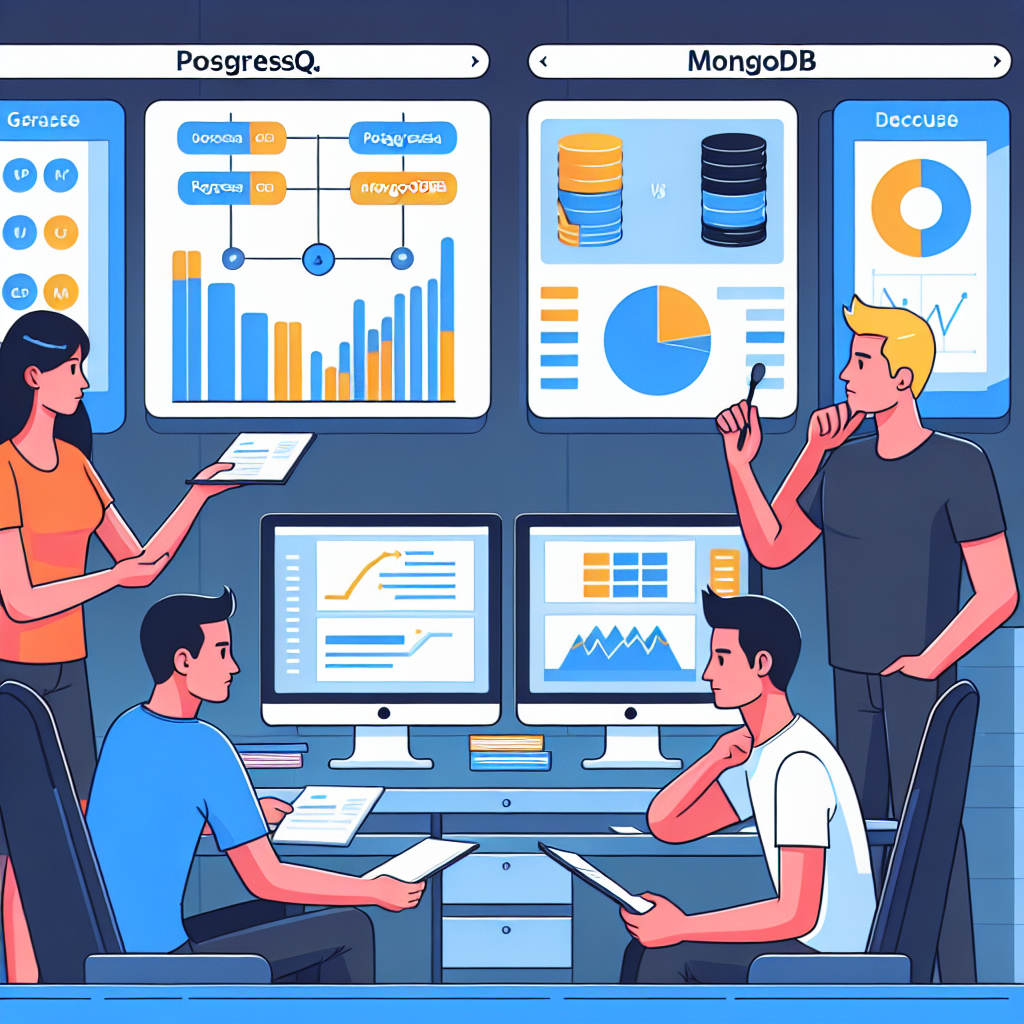
Have you ever wondered what PostgreSQL is and why it’s gaining so much traction in the world of databases? ⭐ Let’s dive into this amazing technology that is revolutionizing how businesses manage their data.
PostgreSQL (pronounced "Post-Gres-Q-L") is an advanced open-source database known for its robustness and flexibility. Unlike many other database management systems, it allows you to store data in a way that is structured yet incredibly versatile. Whether youre a budding entrepreneur or a seasoned developer, knowing PostgreSQL gives you a significant advantage in developing modern applications.
So, why should you care about PostgreSQL in contrast to other databases? Let’s break it down with a brief comparison.
| Feature | PostgreSQL | MySQL | MongoDB |
|---|---|---|---|
| Data Integrity | Yes | Partial | Less Focused |
| Performance | Excellent | Good | Good |
| Extensibility | High | Moderate | Moderate |
| Popularity | Increasing | Very High | High |
| Open Source | Yes | Yes | Yes |
Many companies today are leveraging the power of PostgreSQL for various applications. For instance, small businesses and startups often use it for developing robust data-driven web applications, thanks to its cost-effectiveness. Large companies like Apple and Instagram have also adopted PostgreSQL for their backend systems because of its capability to manage high traffic and substantial data loads.
Let me share a story about one of our clients, a local e-commerce business. They came to us plagued with system crashes during peak shopping seasons, which severely impacted their sales. By integrating PostgreSQL into their system, we managed to increase their databases efficiency, reducing downtime and enabling them to handle double their usual traffic without hiccups. Just last holiday season, they reported a 30% increase in sales thanks to supported, streamlined data management! ⭐
If youre considering adopting PostgreSQL, here are some quick tips:
Are you ready to take the leap into the world of PostgreSQL? Contact our team at webmaster.md today for expert assistance! With over 20 years of experience, our professional specialists are here to provide a full spectrum of IT services and ensure smooth integration of systems. Call us at +373 601 066 66 or visit our website to get started!

Are you curious to know how PostgreSQL is transforming the landscape of data management and application development? ⭐ This powerful open-source database isnt just a buzzword; its a tool many businesses rely on for effective and efficient data handling. Lets explore its real-world applications and some impressive success stories that highlight its capabilities.
PostgreSQL is versatile, making it suitable for various applications. Here are a few key areas where organizations typically deploy PostgreSQL:
One of our clients, a mid-sized online retailer, faced challenges with outdated database technology that couldn’t handle their growing transaction volumes. They were losing sales during high-traffic periods and had to deal with slow query responses that frustrated their customers. ⭐ By migrating to PostgreSQL, they not only improved their data processing speed but also enhanced the overall shopping experience on their platform. Their conversion rates boosted by 25% during the holidays, directly leading to increased revenue! ⭐
A local consultancy firm recently wanted to set up an analytics dashboard for their clients to visualize data and generate reports more efficiently. They needed a reliable system to support their demand for complex queries and data analysis. Enter PostgreSQL! They utilized its advanced features to build a robust analytics platform that now supports real-time data processing with minimal downtime. This adaptability allowed them to capture a larger market share as clients began to recognize their enhanced reporting capabilities.
Did you know that PostgreSQL can handle geospatial data through its PostGIS extension? This feature opens up a world of possibilities for businesses in logistics, urban planning, and more! For instance, a municipal planning department used PostgreSQL to analyze geographic data for city development projects. The insights gained from spatial queries led to informed decisions about resource allocation, significantly enhancing the quality of life for citizens. ⭐️
After migrating to PostgreSQL, our clients have consistently shared positive experiences. One marketing agency highlighted how their data retrieval times improved drastically, allowing them to run more in-depth analyses in less time. “PostgreSQL has been a game-changer for us,” they said. “The efficiency we gained opened up opportunities for insight that we never thought possible!” ⭐
Here’s a quick summary of how various businesses have harnessed the power of PostgreSQL:
Are you convinced about the power of PostgreSQL? If you’re looking to enhance your business with this advanced database solution, don’t hesitate to reach out! We at webmaster.md are ready to assist you in implementing PostgreSQL for your organization. With over 20 years of experience in IT services, including software development and database management, we can provide tailored solutions to meet your specific needs. Call us at +373 601 066 66 or visit our website today!

When choosing a database management system, two names often pop up: PostgreSQL and MySQL. But which one should you choose? ⭐ In this section, we’ll take a closer look at how they stack up against each other. This way, you can make an informed decision that best suits your needs.
Before we dive into the comparison, let’s briefly define what both databases offer.
Performance can be a key differentiator when evaluating PostgreSQL versus MySQL. Here’s how the two databases compare:
| Feature | PostgreSQL | MySQL |
|---|---|---|
| Transactional Support | Full ACID Compliance | ACID with limitations |
| Data Types | Support for a wide range of data types | Common data types only |
| Complex Queries | Excellent performance | Good, but slower for complex transactions |
| Concurrency | MVCC (Multi-Version Concurrency Control) | Table locking mechanism |
| Scalability | Highly scalable | Good, but can struggle with large datasets |
Let’s break down some core features that set PostgreSQL apart from MySQL:
One of our clients, a growing SaaS provider, initially used MySQL but found themselves hitting performance bottlenecks as they expanded. They faced challenges with data integrity and complex queries, which slowed down their operations. After migrating to PostgreSQL, they realized significant improvements: data integrity issues were resolved, and they could execute complex queries more efficiently. They noted a 40% reduction in processing time for key operations, which translated into smoother customer experiences and increased satisfaction! ⭐
Let’s consider a couple of scenarios to illustrate the strengths of each database:
Feedback from clients who transitioned from MySQL to PostgreSQL is overwhelmingly positive. For instance, a financial firm remarked, “Migrating to PostgreSQL not only boosted our performance but also gave us peace of mind regarding data security and integrity. We’ve never looked back since!” ⭐
Ultimately, choosing between PostgreSQL and MySQL comes down to your specific use case:
Still unsure? Let us help you make the right decision tailored to your needs! At webmaster.md, we have over 20 years of experience in IT services, including database management solutions. Contact us at +373 601 066 66 today to discuss your unique requirements and find the best database solution for your business!

When it comes to choosing a database, the debate between PostgreSQL and MongoDB often sparks heated discussions among developers and business owners alike. ⭐ But is PostgreSQL really better than MongoDB, or are there specific scenarios where MongoDB shines? Let’s clear the air by debunking some common myths and misconceptions surrounding these two powerful databases.
Before diving into the comparisons, let’s take a moment to understand the core functionalities of both databases:
Now, let’s touch on some misconceptions that often arise when comparing PostgreSQL and MongoDB:
This is far from the truth! While PostgreSQL is primarily a relational database, it also supports JSON and JSONB data types, enabling you to store semi-structured and unstructured data efficiently. ⭐ Businesses utilizing PostgreSQL can benefit from both structured data integrity and the flexibility of document storage.
While it’s true that MongoDB excels in certain high-speed data retrieval scenarios, it does not mean it universally outperforms PostgreSQL. When dealing with complex queries, aggregations, and transactions, PostgreSQL’s advanced query optimization can offer significant speed advantages. ⚡ Testing with actual workloads is essential to determine performance for your use case.
Contrary to popular belief, PostgreSQL scales efficiently to handle large datasets. Many organizations, including giants like Apple and Instagram, use PostgreSQL to manage vast amounts of data. It is equipped to handle complex and high-volume transactions with ease. ⭐
While MongoDB’s document structure is great for certain types of data analysis, PostgreSQL’s analytical capabilities are robust and versatile. With features like window functions, CTEs (Common Table Expressions), and full-text search, PostgreSQL can provide real-time analytics for various applications effectively. ⭐
Both databases have unique strengths, so choosing the right one greatly depends on your specific needs:
Many businesses have successfully utilized both PostgreSQL and MongoDB. For example, a fintech startup chose PostgreSQL due to its robust transaction handling, allowing them to maintain data integrity while executing complex financial transactions. This resulted in zero data inconsistencies, contributing to their rapid growth. ⭐
On the other hand, a digital marketing agency leaned on MongoDB to manage vast amounts of user-generated content and real-time analytics for their campaigns. This flexibility contributed to their ability to innovate and adapt quickly to market trends. ⭐
Clients who have made the switch to PostgreSQL often share their success stories. One client said, “Switching to PostgreSQL allowed us to achieve better performance for our complex queries. Our customer satisfaction improved as we could deliver reports faster!” ⭐
In conclusion, while PostgreSQL and MongoDB serve different purposes, neither is wholeheartedly better than the other. The decision depends on the specific requirements of your project and the type of data you handle. If you find yourself debating between the two, dont hesitate to reach out for guidance!
At webmaster.md, we have over 20 years of experience helping businesses choose the right technology stack. Whether you need a relational database like PostgreSQL or a NoSQL solution like MongoDB, our professional specialists are here to assist you! Call us at +373 601 066 66 or visit our website today to get started!
Leaders in the IT market |
| 14+ years of experience and innovative solutions to help your business stand out and grow. |
Inspiring portfolio |
| 150+ successful projects: from sleek landing pages to complex corporate systems. |
Team of experts |
| 51+ professionals who bring your ideas to life with maximum efficiency. |

| NOTORIUM TRADEMARK AWARDS |
| Notorium Trophy 2017, Notorium Gold Medal 2018, Notorium Gold Medal 2019 |

| TRADE MARK OF THE YEAR |
| Gold Medal 2016, Gold Medal 2017, Gold Medal 2018, Gold Medal 2019 |

| THE BEST EMPLOYER OF THE YEAR |
| According to the annual Survey conducted by AXA Management Consulting - 2017, 2018, 2019 |